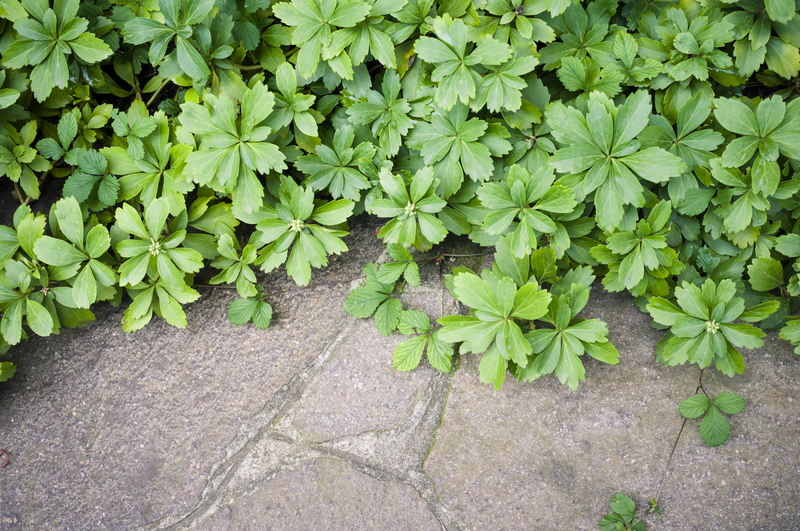Master the Art of Zen Landscaping to Create a Peaceful Backyard Sanctuary
Posted on 25/06/2025
Imagine stepping into your backyard and being instantly transported to a serene haven, free from stress and the hustle of daily life. This is completely achievable by embracing the art of Zen landscaping. Rooted in ancient Japanese aesthetics, Zen landscaping prioritizes simplicity, balance, and tranquility. Whether you have a sprawling garden or a compact outdoor space, you can create a peaceful backyard sanctuary by following the timeless principles of Zen design.
Understanding the Essence of Zen Landscaping
Zen landscaping (sometimes called Japanese rock gardening or Karesansui) is more than just an aesthetic--it's a philosophy that emphasizes harmony between nature, space, and human presence. These landscapes draw inspiration from Buddhist teachings, focusing on meditation, reflection, and mindfulness. By mastering Zen landscape design, you can cultivate a backyard retreat that fosters inner peace.
The Core Principles of Zen Garden Design
- Minimalism: Zen gardens use a minimalist approach, eliminating excess and celebrating the beauty of empty (negative) space.
- Natural Materials: Utilizing rocks, gravel, sand, water features, and plants creates a calming, earthy palette that connects you to nature.
- Balance and Harmony: Every element is carefully placed to create a sense of equilibrium and effortless flow.
- Simplicity: A Zen landscape exudes understated elegance and avoids overly ornate decorations.
- Symbolism: Each component, such as stones or water features, holds meaning that encourages contemplation.

Benefits of Creating a Zen Backyard Sanctuary
Beyond visual appeal, Zen-inspired landscaping offers multiple tangible and intangible benefits:
- Reduces Stress: Calm, uncluttered spaces promote relaxation and mindfulness.
- Boosts Mental Wellness: Gardens designed for reflection can aid meditation and mental clarity.
- Encourages Outdoor Living: A tranquil sanctuary draws you outside more often for reading, resting, or mindful practices.
- Increases Property Value: Thoughtfully landscaped backyards can make your home more appealing to buyers.
- Environmental Harmony: Native plants and natural materials create sustainable, eco-friendly gardens.
Step-by-Step Guide: Transform Your Backyard into a Zen Oasis
Making your backyard a peaceful Zen sanctuary is easier than you think. Follow these steps to create a harmonious retreat tailored to your space.
1. Assess Your Space and Set Intentions
Start by observing your backyard. Consider its shape, sunlight, and existing vegetation. Ask yourself:
- What kind of ambiance do I want?
- How will I use this space?
- Do I need a meditative focal point or a quiet reading nook?
Setting intentions helps guide your design choices and ensures your sanctuary meets your unique needs.
2. Choose a Simple and Calming Color Palette
Zen landscapes typically employ a restrained color palette--shades of green, soft greys, browns, and neutral tones. Introduce subtle pops of color, such as cherry blossoms or Japanese maples, to enhance visual interest without overwhelming the senses.
3. Create Structure with Rocks and Gravel
Rocks and gravel are foundational in Zen gardens. Use large stones as anchor points, arrange smaller rocks to form natural borders, and spread gravel or crushed granite for pathways. Raked gravel or sand symbolizes water and introduces rhythm to your space.
- Rocks: Use three, five, or seven stones to create balanced groupings (odd numbers look more natural).
- Gravel or Sand: Rake in wave or ripple patterns to mimic flowing water and encourage meditative thought.
- Stepping Stones: Flat stones can form meandering pathways for mindful walking.
4. Add Water Features for Tranquility
The gentle sound of water is central to creating a tranquil garden sanctuary. Consider installing a small pond, stream, or minimalist fountain. Even a subtle stone basin (tsukubai) can be effective, providing a spot to rinse your hands and release daily worries.
- Bamboo fountains (shishi-odoshi): Create rhythmic, meditative sounds.
- Ponds: Reflective surfaces enhance the garden's sense of depth.
- Water bowls or birdbaths: Invite wildlife, fostering a vibrant ecosystem.
5. Select Plants That Embody Peace and Simplicity
Choose plants that evoke calm, are easy to maintain, and suit your region's climate. Opt for a mix of evergreens and seasonal accents for year-round interest.
- Bamboo: Symbolizes strength and flexibility, ideal for screens or backdrops.
- Moss: Softens rock edges, absorbs sound, and thrives in shade.
- Japanese Maples: Offer striking foliage in red and gold.
- Ferns, Camellias, Hostas: Add texture and layers without clutter.
- Ornamental Grasses: Their movement sways in the breeze, encouraging mindfulness.
Keep plantings sparse and avoid overcrowding. This highlights each species and preserves negative space--an essential Zen landscaping element.
6. Incorporate Natural Wood Elements
Wood bridges, fences, benches, or pergolas introduce warmth and structure to Zen gardens. Use untreated or lightly stained wood for an organic look. Traditional bamboo fences can provide privacy while enhancing authenticity.
7. Define Quiet Zones and Focal Points
Create spaces for solitude and reflection by introducing a bench, stone lantern, or meditation platform. A simple seating area facing a key view or water feature encourages mindful presence in your garden sanctuary.
- Stone Lanterns (toro): Classic features that add ambiance and guidance after sunset.
- Zen Statues: Buddha figures or pagodas enhance spiritual undertones.
- Tea Garden Corners: Set aside space for tea ceremonies or reading rituals.
8. Harness Soft Lighting
Subtle, indirect lighting transforms your backyard Zen garden in the evening. Use low-voltage LED path lights or solar lanterns to illuminate walkways. Avoid harsh spotlights--gentle glows are soothing and invite nighttime contemplation.
9. Maintain Balance with Open Space
One of the most defining characteristics of Zen gardens is their embrace of ma--the space between elements. *Leave areas unplanted or unadorned* to highlight stillness and let your mind wander freely. Remember, a peaceful sanctuary is one where every addition is intentional.
Expert Tips to Enhance Your Zen Garden Sanctuary
- Stay Grounded in Authenticity: Let your personal taste guide you, but draw from traditional Japanese elements for a true Zen vibe.
- Use Asymmetry: Imperfect symmetry is natural; group rocks, plants, and features in a way that feels organic.
- Focus on the Senses: Add fragrant shrubs, wind chimes, or tactile surfaces to deepen relaxation.
- Practice Mindful Tending: Routine grooming, pruning, and raking can become meditative practices.
Common Mistakes to Avoid When Creating a Zen Backyard Retreat
While mastering Zen landscaping, keep these pitfalls in mind to preserve its authentic tranquility:
- Overcrowding: Avoid adding too many plants or ornaments; stick to the "less is more" mantra.
- Bright Blues or Reds: These can feel jarring and break the sense of calm; favor natural hues.
- High-Maintenance Plants: Choose easy-care species that thrive in your climate and soil.
- Mismatched Styles: Keep decor consistent--resist mixing Zen with unrelated garden ornaments.
The Zen Mindset: Beyond Landscaping
To master the art of Zen gardening, cultivate a mindset aligned with Zen philosophy. Approach your outdoor sanctuary as a space for meditative reflection, gentle movement, and present-moment awareness.
Treat your garden as a living, growing meditation. Regularly dedicate a few minutes to raking gravel, trimming plants, or simply sitting in contemplation--each act becomes part of your mindfulness practice.
Incorporating Zen Rituals into Your Outdoor Sanctuary
- Walking Meditation: Use winding paths for slow, intentional walking that calms your spirit.
- Meditative Tea Drinking: Enjoy tea while savoring the sight and sounds of your garden.
- Journaling or Reading: Capture your thoughts or immerse yourself in a book, surrounded by peaceful beauty.
- Yoga or Breathing Practices: Use your sanctuary for gentle stretching or guided breathing to start and end your day with serenity.
Curating Your Unique Backyard Sanctuary: Personalization Ideas
Your Zen garden should reflect your personality and needs. Consider these ideas for personalization:
- Seasonal Interest: Plant blooming camellias for winter, irises for spring, and fiery maples for fall.
- Soundscapes: Hang bamboo wind chimes or install a soft bubbling fountain.
- Cultural Touchstones: Add calligraphy stones or poetry plaques for inspiration.
- Wildlife Havens: Create spots for birds, bees, and butterflies with native flowers.

Maintaining Your Zen Landscape for Lasting Tranquility
A true Zen backyard sanctuary is ever-changing but never overgrown or chaotic. Consistent but gentle maintenance keeps your retreat peaceful:
- Rake gravel or sand regularly to renew patterns and clear debris.
- Prune shrubs and trees carefully to retain structure and balance.
- Weed as necessary to emphasize intentionality in plant selection.
- Wipe or clean water features frequently for purity and clear reflections.
- Change out or reposition focal features seasonally to renew perspective.
*Read maintenance as an extension of mindfulness*, connecting you to each aspect of your living sanctuary design.
Conclusion: Master the Art of Zen Landscaping for a Peaceful Backyard Sanctuary
Transforming your backyard into a Zen-inspired retreat is a rewarding artistic and personal journey. By focusing on simplicity, balance, and harmony with nature, you unlock a tranquil haven for relaxation and meditation. Choose natural materials, add gentle water features, create meaningful focal points, and foster open space--the building blocks of a peaceful backyard sanctuary.
As you master the art of Zen landscaping, remember: more important than perfection is presence. Every moment you spend tending, sitting, or wandering through your sanctuary becomes an act of mindful living. The beauty of your Zen oasis will grow not only in the landscape, but also within you.
Ready to create your own backyard Zen sanctuary? Start small, dream big, and embrace the art of tranquility right at home.
Latest Posts
Enhance Your Garden with Cozy Seating Spots
Garden Like a Pro: 9 Essential Tips Every Beginner Needs
Evergreen Climbers for Shade: Nature's Drifters for Shadowed Nooks

